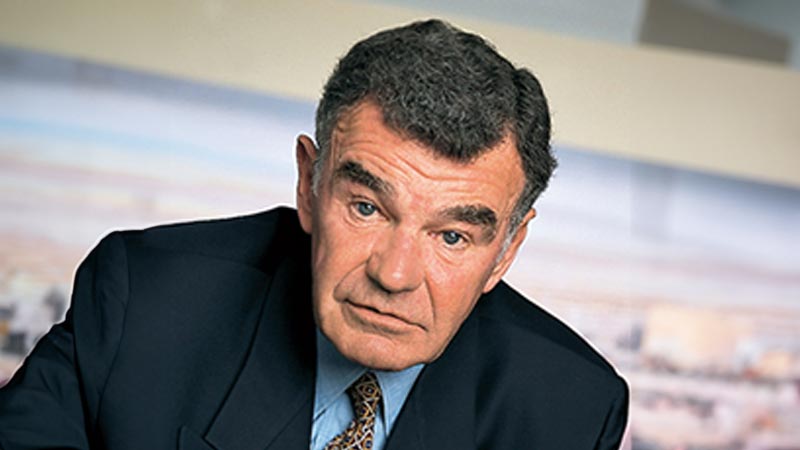Remembering former dean John Gordon
Posted on May 5, 2020
Kingston, Ont. – John R.M. Gordon, who as dean of Smith School of Business in the 1980s weathered harsh recessions and declining funding for universities, but still grew the school’s programs and reputation while forging ties with business, passed away in Kingston last month. He was 85.
Gordon led the school from 1978 to 1988. During that time, he revived Smith’s Advisory Council, made up of CEOs and top leaders from business and government to advise the school. And he laid the groundwork for what would become the Executive MBA programs.
The late 1970s and early ’80s was a difficult time in North America economically. The 1979 Oil Shock and subsequent recessions took a toll. Gordon, though, maintained his optimism and enthusiasm for what a business school could offer. As dean, he sought to strengthen ties with alumni and he encouraged entrepreneurial faculty to establish the executive education programs.
He made relationships with the wider business community a priority (seeing it as a win-win for business and education) and encouraged students inside the classroom and beyond it. Two longstanding institutions run by the Commerce Society started under Gordon: QBET (the Queen’s Conference on the Business Environment Today) and ICBC (the Inter-Collegiate Business Competition).
“Give ComSoc some seed money and a word of encouragement—and stand back!” is how Gordon once described his philosophy of supporting student ideas.
William Cannon, a fellow faculty member, remembers Gordon as someone continuously positive and a “cheerleader” for the business school and Queen’s. “He was always upbeat and optimistic about the future and always expected to find a solution.”
“I remember him bringing me to the Business Advisory Council meetings and asking the executives what we should pay attention to, while also telling them about the wonderful things the school was doing and encouraging them to work with the school and hire our graduates,” Cannon recalls.
A lifelong believer in the power of education, Gordon insisted that he continue to teach a regular Commerce and MBA class while he served as dean. In a 1987 interview, he explained why: “First, I enjoy teaching. Second, it’s like being out on the factory floor. If you’re running a company and never go out on the factory floor, then you really don’t know what your organization is all about. Students can give you a good indication of what is going on in the school, because they are its lifeblood.”
Gordon was hired to teach at Smith in 1975. He and other professors brought a new kind of teaching to the Smith classroom: the case-method. It was not, however, his first time at the school—or teaching in Kingston.
Gordon grew up an "air force brat”. When he was nine, his family moved to Edmonton. Until then, he had changed schools and cities every year. After graduating from the University of British Columbia with a Bachelor of Science in mechanical engineering, he went to work for the Navy’s Fleet Air Arm. An interest in teaching then took him to Royal Military College in Kingston as a lecturer.
While teaching at RMC full time, he also pursued his MBA part time at Smith—a workload that sometimes created havoc with his schedule. As Gordon recalled in a later interview, he often had to teach a class in mechanical engineering at 8 a.m. at RMC, then make it to Queen’s for his 9:10 a.m. business class. The setup worked, he joked, as long as the causeway bridge in downtown Kingston didn’t go up and bring traffic to a halt. Needless to say, “[I] was a little tired by the end of each week,” he added.
After earning his MBA, he headed to MIT in Boston for his PhD. Then it was on to Western University in London to teach. By the early 1970s, Gordon was in Switzerland teaching at IMEDE (now called IMD). He helped to establish that school’s MBA program.
Returning to Smith in Kingston, Gordon became a favourite among students and a mentor and inspiration to his peers. Among them was Ken Wong, BCom’75, MBA’76; he was a student of Gordon’s and was later hired to teach by Gordon during his tenure as dean.
“He was the first professor I had who used case instruction, which is now my primary teaching methodology,” said Wong, who called Gordon a friend and mentor. He credits Gordon’s leadership with growing the vision for Smith to become a school that balanced research and teaching.
“It was a marvel to watch him and his wife, Virginia, work a room, as they were constantly making introductions,” Wong said. “He managed the school in the same way. He tried to make certain that faculty touched base as the school became larger.”
“John was instrumental in managing our transition to a top-tier business school,” added Wong. “We were always good, and he took us that extra step to great.”
After stepping down as dean, Gordon continued to teach at Smith and do research. He was named a professor emeritus and inducted into the Faculty Hall of Fame at Smith. Gordon retired in 2005 but continued to teach for several years after.
In retirement, he stayed involved in the Kingston business community. He and a group of friends started an organization called RELIKS (Retired Executives Living in Kingston) to champion and mentor local entrepreneurs. And he conceived the Kingston Ventures Study Tour to expose students to business opportunities in Kingston.
Gordon met his wife, Virginia, while studying at UBC in the 1950s and they married upon graduation. She survives him, as do their three children: Jane, Charles and Ian. All three attended Queen’s, as did two of his seven grandchildren.
A reception in commemoration for John Gordon will be held at a later date.
In memory of John Gordon, donations can be made to the Dean’s Innovation Fund at Smith School of Business.